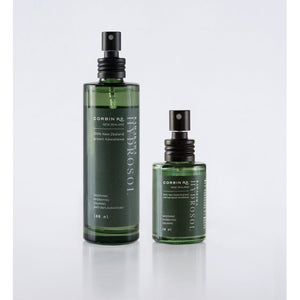We all have those days when we are frustrated and disheartened with the way our skin is behaving. I’m talking about that flat feeling of annoyance that we’ve been doing all of the right things and it’s just not playing the game.

First and foremost, it's important to know what our skin is trying to tell us—whether it’s not happy with a product we’ve been using or a food we’ve been eating. Of course, sometimes we just break out, or experience a flare-up, regardless of how much research, kindness and more frustratingly, when we are putting a lot of time and money into your skincare routine!
In times like these, managing the stress that comes from that inner self-criticism is also important. Research has since shown the link between stress and inflammation of the skin and it’s useful to know how to manage these feelings when they crop up.
The skin is outward-facing, it's often seen as a means to an end rather than the complex and intelligent organ that it is. So many of us refer to "good skin" and "bad skin," but we don't hold any other organs to this standard—we don't tend to talk about for instance, "good bladders" and "bad bladders".
Can we think our way to clear skin?
Not quite, and it would be annoying to say so. However, the brain and nervous system can influence the skin's immune cells through various receptors and chemical messengers such as neuropeptides. Therefore, implementing simple tips starting in the brain, do flow down into the organs and the body and can help to reduce “Skin Stress”.

Keep these tips in mind for when you're just having one of those days:
1. Acknowledge the anger and then decide to shift the inner voice to a more compassionate one
I suggest even repeating a helpful affirmation statement to yourself, "Even though I am feeling angry, I choose to love and accept myself anyway." It may feel a bit odd to speak to ourselves in this way, but the more we practice, the more it becomes more natural for the brain and it becomes a habit.
2. Express gratitude for the skin's important functions
The skin is our biggest functional organ in the body. It not only gives clues into what's happening beneath the surface in terms of immune system strength, nutrition, oxidative stress, and metabolic issues, to name a few, but it's the body's first line of defence against infection, environmental stressors, and loss of nutrients and water, It is constantly interacting with our environment and works to support our health by protecting against infection, influencing the immune response and protecting against UV radiation. Try to express gratitude for what we can. This may be “I’m grateful that my skin gives me messages and talks to me about what my body needs.” “I’m grateful that my skin protects me from pollutants”
3. Track small changes
Do keep track of improvements. When we achieve goals, this sends a surge of dopamine to the brain; neurologists even recommend small checklists so that we can knock off smaller wins and feel satisfied.
Setting goals with skin care, could mean taking a weekly photo of skin to compare changes, or taking notes to track progress. Even something small can be enough to help stimulate a positive mindset.
4. Meditate or do some breathwork
When we activate the parasympathetic nervous system through meditation and good breathing techniques, we tap into the rest and digest functions in the body. When we tap into that, we send energy to replenish our organs that don’t receive energy when we are stressed…. Aka the skin!

It can be easy to feel frustrated with our skin if we aren't seeing results—it’s good to remember that progress does take time and consistency and our skin is working hard on a variety of functions. When those days pop up where we just can’t escape from the self-criticism, keep these stress-relieving tips under your belt and be kind to yourself.
As Roald Dahl said, “If you have good thoughts they will shine out of your face like sunbeams and you will always look lovely.”

LIBBY RAINGER:
NLP practitioner (Neurolinguistic Programming), Clinical Hypnotherapist (Dip Clin), Lightning Process Practitioner & qualified yoga teacher.
From a young age, I was always very interested in all things health and the mind-body connection. When addressing our health and happiness, I do love a good bit of balance and I think we need to look at all areas of our life. A huge factor, living in 2020 is stress and I love to teach about the effects of stress and simple concepts on how to rewire our brains and bodies for better health and a calmer life!


